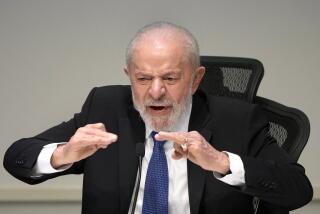Guerrillas Offer to Participate in El Salvador Vote
- Share via
SAN SALVADOR — In a major reversal, El Salvador’s Marxist guerrilla movement said Monday that it will urge its followers to participate in presidential elections and accept the outcome of the vote if the government and military follow several conditions.
Until now, the guerrillas of the Farabundo Marti National Liberation Front (FMLN) had refused to recognize the legitimacy of the presidential election set for March 19. Instead, they had demanded a negotiated settlement that would give them a significant power-sharing role in the government and the integration of rebel troops into the country’s regular armed forces.
In a 2 1/2-page plan obtained by American journalists, the FMLN proposed postponing the election until Sept. 15, El Salvador’s Independence Day.
As conditions for their participation, the guerrillas called on the government and the military to “immediately cease the assassinations, kidnaping and repression” of opposition groups and to stop interfering with the campaign activities of all parties.
The document also demanded the reorganization of election organizations to include the Democratic Convergence, a grouping of leftist parties that has already entered a candidate, Guillermo Ungo, in the election, and unnamed religious, humanitarian and civic groups in the electoral process.
In addition, the FMLN said it wants the military and other security forces to be confined to their barracks the day of the vote and not to participate in any way in the election.
Finally, the document asserted the right of all Salvadorans, including those living outside the country, to vote under international supervision, and urged that “the United States stay out of the electoral process and give no support to any party.”
For its part, the FMLN agreed to urge total participation and acceptance of the election’s results and added that if its conditions were met, it would respect the political activity of all parties. That apparently is an oblique way of saying that it would not attack rallies and organizers of the other parties.
The rebels also said they would stop their attacks and threats on the country’s mayors if the officials stopped organizing quasi-military civil defense groups, and would declare a five-day truce around the day of the voting.
Although the guerrillas did say they would accept the current government of President Jose Napoleon Duarte “in order to facilitate the implementation of this proposal” during the transition to the election, they did not mention immediately calling a halt to or scaling down their current level of military activity, which has resulted in the worst violence of the last three years.
Diplomats said this seems to imply that the rebels intend to keep fighting, thus raising doubts that their proposal is serious. Observers say that it is unlikely--if not impossible--for the Duarte government to accept any change in the election process while FMLN attacks continue.
However, there appears to be some room for negotiation and compromise in both the document and in the attitude of the government.
The FMLN asked that Roman Catholic Archbishop Arturo Rivera y Damas act as an intermediary in talks between the two sides on how to carry out the proposed changes, implying that some compromises might be possible.
Also, Duarte has held meetings with the rebels in the past and has called on them to take part in elections. And Fidel Chavez Mena, the presidential candidate of Duarte’s party, the Christian Democrats, recently said he favors “a dialogue” with the rebels.
There was no immediate reaction from the government, the military nor the party now favored to win the election, the Nationalist Republican Alliance. The alliance, known as Arena, is a hard-line right-wing group that has called for an all-out campaign to exterminate the guerrillas.
More to Read
Sign up for Essential California
The most important California stories and recommendations in your inbox every morning.
You may occasionally receive promotional content from the Los Angeles Times.













